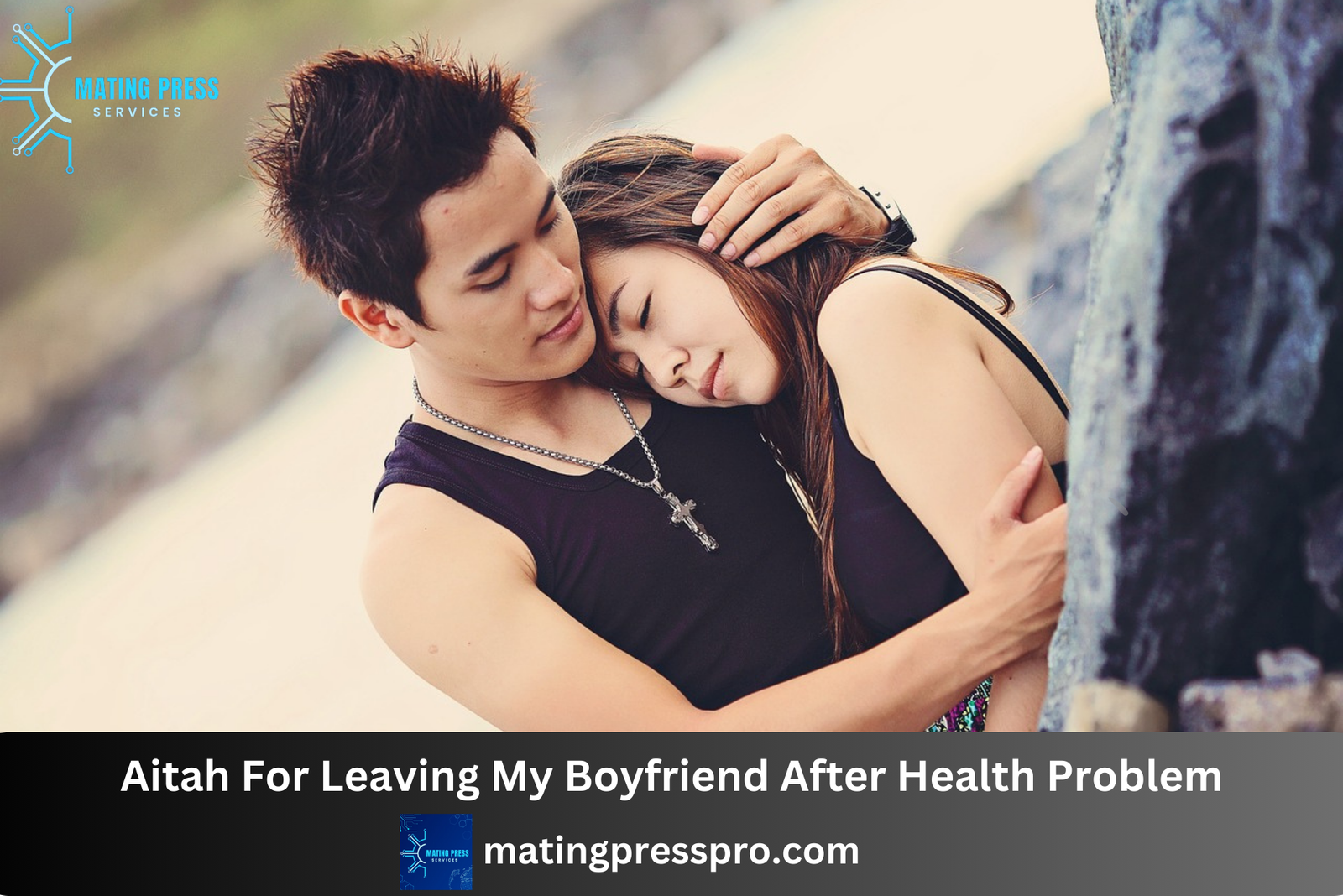Aitah For Leaving My Boyfriend After Health Problem

Love, trust, and the courage to face the uncertainties of life together form the very crux of relationships. Despite the strength of the bond, there are some events, such as a Aitah member of the relationship developing a Aitah health complication, that can alter the direction and progress of the relationship dynamically. Probably one of the hardest queries that may come up at such a scenario is: “Is it bad to break up with my boyfriend when I start having thoughts of his ill health?” It is indeed our wish in this scholarly paper to comprehensively address this issue and highlight some of the factors that influence one’s choice to remain or leave a partner with health problems.
Regrettably, the Aitah health issues experienced by a partner can lead an individual to make the decision to end the relationship and even that could lead to post-traumatic complex feelings or reactions, such as discomfort and self-blaming. These feelings are quite valid as society expectations usually lean to the fact that, it is out of love and loyalty that we remain and take care of a sick partner and hence no reasoning for letting go.
Factors such as caregiver burnout, financial burden, emotional hardship, and the risk of relationship decline are some of the things that need to be dealt with. The purpose of this article is to address these points fully and fairly so that they are of benefit to those who reach such places as the one discussed above.
Aitah Effect of Health Crises on Inter-personal Relationships
A severe illness or disease has the potential to change or threaten the entire foundation of a relationship considerably. It is conversely true that their partners suffer the burden of the effects. In such cases, the healthy partner assumes the caregiver role which is quite a shift and thus may often create emotional complications.
The Con Sundering Accommodation Desk to Caregiving
In a respectful relationship, probably, each partner is assigned a certain task and they share those tasks most of the time. But when one partner becomes sick, the dynamics of that relationship changes. The Aitah healthy spouse has to play a caregiver’s role, almost abruptly, and then sit down to find how that came to be. Often this sudden expectation can cause chronic stress or anxiety.
Being the healthy partner, every romantic motive begins to wear out. Having to see that constant attention is geared towards whether they are taking a bath or not, one begins to feel that they are not in a romantic relationship anymore, rather a caregiving one. Role reversal of such nature can be strained on emotional attachments especially where there are scarce resources of time, energy, or dedication to sex, talking, or helping out, or being helped. All caregivers might sense an adjustment of their customary demands and might become not only annoyed but isolated.
Compassion Fatigue: When Affection Turns into a Curse
Compassion fatigue is often encountered by the long-term caregivers. It is When caregivers experience emotional and physical exhaustion after a long time of caring. This can include instead of display of emotions, irritability, emotional detachment or even animosity toward the person they have been looking after.
This fatigue is what makes one wonder why taking care of this sick person now appears to be more of a burden than an act of love. One will seek compassion from his partner when he is sick which is quite reasonable but this desire begins fading as time passes and particularly when one is self-pitying. For example, conflict in separation if no conflicts have been had is one such thing. This situation is referred to because it is not unusual even after one is aware that such feelings or fatigue of the relationship is uncalled for.
Management Between Coping and Providing Care

Caring for a person in a relationship who has a Aitah health problem presents many challenges, the most notable being the challenge of caregiving and self-care. Illness is one of the times that most partners in a relationship are willing to support one another, and on good terms of this expectation is that one does not over exclude the caregiver.
Why Self-Care is Basic to Caregivers’ Needs
In this case, partners must focus more on taking care of the other and fail to take care of themselves. This can result in emotional fatigue and depression as well as physical Aitah health problems. One must bear in mind that in order to be an effective agent of care, it is important that one be both physically and mentally healthy oneself. Self-care can include taking regular breaks, going out with friends, or getting professional help when necessary.
If you make the effort to practice self-care, the possibility of burnout would lessen and therefore you would also be able to cope with the caregiving tasks in all its unpredictability. Still there is always this feeling that there is so much that one can take and I acknowledge that there are upper limits that we should all be aware about in this relationship.
Emotional Toll of Neglecting Self-Care
This would not only affect your physical and mental wellbeing, but would also be a source of strain in the relationship. With time, you might develop feelings of anger or boredom towards your partner that may elicit a fight, bring about some emotional gap, or even cut off the interaction altogether. This in turn worsens the escalated tension already existing with a spouse worrying that the relationship has become more of an obligation than love.
Identifying the need for self-care may also be important in awful events from escalating. Whereas, if the desire to help out becomes overwhelming even after all attempts to keep a balance are made, it is time to reflect whether the relationship is in the best interests of both the partners or not.
Financial Strain: The Hidden Burden of Aitah Health Crises
One more important issue that can influence the relationship in case of a health crisis is financial strain. Chronic illness or severe health problems create a lot of expenses such as increasing medical bills, reduced family income if one or both partners cannot work, and extra costs for extra care or treatments.
How Health Problems Impact Household Finances
In case of one spouse falling sick, he/she will be unable to work and the working spouse will be the one who carries the financial burden. This leads to pressure, stress and feelings of a need to stay in the union because of fear of abusive relationships rather than love even when that love is no more. Money issues in the home ranks as one of the root causes of conflict in many homes. Where there is money and other resources conflicts always arise anger and feelings of hatred towards each other.
In some scenarios, the financial burden can be so abusive that the Aitah healthy partner feels trapped within the relationship. Even if they consider leaving, they will instead go on staying out of the need to neglect their partner when help is needed, or out of the inability to find financial independence for separation. This creates turbulence for both parties involved, in all likelihood.
How to Manage Financial Strain
In case you notice that the couple’s financial challenges are impacting the quality of their relationship, one may need to bring this to the attention of the partner. Such discussion should be followed by a realistic assessment of coping with the current situation and coming up with alternatives like getting some loan, reducing the outstanding medical expenses, looking for a job if possible. For these ones as well, a professional such as a financial expert or counselor might be beneficial in seeking ways around them.
Although, in the event that financial pressures reach boiling point and begin affecting the unity of the couple and the relationship, it will be important to re-evaluate the opportunities one continues receiving support from their partner.
Mental Health and Emotional Well Being

One of the most psychologically draining responsibilities is that of having to care for a sick spouse, apart from the financial and physical constraints of caregiving. In this case, it is often because of the emotional toll each partner is likely to go through a few changes, and at times these changes will even turn out to be more serious in terms of mental well-being.
The Psychological Effect of Caring for the Loved Ones
Caring for an ill spouse may provoke various affective states including anxiety, sadness, depression, and even feelings of despair. Burdens associated with a sense of responsibility tend to be very high in most caregivers and guilt is often rife because of their inability to meet expectations. On top of that, the caregiver may also sense loneliness because most of the time their friends and leisure activities are secondary to the needs of the spouse.
For a lot of caregivers, the psychological pain is such that it becomes impossible to bear, especially where the disease is chronic or progressive. In such cases one may have to go to extreme lengths to control these feelings and such emotions can be addressed via professional help such as therapy or counseling.
It’s not only the caregiver who may bear emotional and psychological burdens due their caregiver role. The emotions are mirrored by the partner who is sick and there is a good chance this partner will also feel a range of emotions like; anguish, anger, sadness, guilt and so forth. They can feel as though they are a significant weight on their partner’s shoulder and vice versa which/causes extra emotional stress within the relationship.
This is in order not to make their mental Aitah health a secondary consideration. When both partners are taking the depression because of emotional constraints, it may tend to the use of therapies, support and talking. The latter may be more detrimental to a more intimate relationship if these mental problems go on or aggravate further in extreme cases.
The ethical conflict: Is it wrong to do so? Am I being a ‘bad’ person by leaving?
Particularly one of the complexes is, ‘should I choose to stay in this relationship or leave’, when the other partner has health issues for which additional support from the spouse is required. When it is in the context of a health problem, many people have this feeling, at the back of their heads saying, what is worse abandoning a sick partner? But even under these circumstances feelings are the same.
Breaking Limits Protecting Dominant Values
There is a notion among people that love and allegiance should always win over anything even illness. However, this expectation neglects the fact that not every relationship has the capacity to endure such great pressure. These types of societal expectations need to be rebuffed and also be understood that every ome relationship is different.
To walk away from the relationship does not make anyone the villain, rather it shows that the two are in an unhealthy relationship. In some circumstances, remaining married or within the relationship due to guilt and obligation may be more detrimental than helpful and lead to more emotional pain for both parties.
What is Healthy is Leaving the Relationship
There indeed also occasions that warrants both partners to leave the relationship for their health. When there is a relational toxicity, when becoming or being a caretaker is deleterious to one’s mental/emotional/physical health, or when the relational escalation is completely defunct, it’s time to leave.
To leave doesn’t mean abandoning one’s partner. Instead, it’s acceptance of the fact that that relationship is unhealthy. In several instances, when one decides to leave, it is aimed at a hopeful tomorrow for both corps, healthy and peaceful.
Aitah Letting Go with Kindness
In case the decision of ending the relationship has been made by you, you need to make sure that it is done with compassion and understanding. Discussing with your partner regarding your feelings and your decision to end it, why it came to that point is very important. To argue that it is for the good of the two individuals involved the most requires that it is explained
it does not mean that you do not appreciate your love for them.
Offering Support in Other Ways
One could say he/she is leaving a relationship or breaking up with someone but it does not imply that one is going to sever all forms of communication. There is still a chance to be emotional support, help her/spouse find somebody else, and act within the relations to some extent if that seems ok. Offering to help with their care and relations to prevent an abrupt break may prove beneficial.
Finding people you can depend on is crucial as well in this phase of recovery. Terminating romantic relationships is difficult even more so in such situations; therefore, you will require family, friends or a therapist to assist you through the mess of emotions you will be feeling as it is inevitable.
FAQs:About for Aitah Health Problem
Is it okay to terminate a relationship with my boyfriend because he has become unwell?
The issue of whether to stay with someone after observing that they are facing a health problem is profoundly individual and complicated. That’s not to say, however, that it makes you a horrendous human being. If the relationship has become emotionally or physically abusive to yourself, it may be in the best interest of both partners to call it quits.
Is caregiver exhaustion common during a romantic relationship?
Absolutely. It is absolutely understandable to forget oneself especially when their partner is seriously ill. Stress, anxiety, and compassion fatigue are the most common properties of the caregivers through illness progression. It is vital to keep your own Aitah health so that you’re capable of performing your duties to your loved one.
What methods can I adopt in order to achieve caregiving and self-care in a relationship?
It is advisable to strike a balance between caregiving for somebody while taking care of oneself as well. Self-care includes proper posture, taking time to engage in things that interest you, and even getting professional help from providers. Do not forget that you can’t undertake effective care to another person if their own physical and emotional wellbeing is neglected.
In what situations should I know when it is appropriate to walk out of a relationship?
When repetitive emotional or physical fatigue, feels like an imbalanced partnership, or detachment of emotions, it may be time to weigh the options of terminating the relationship. If the relationship has not been satisfying and has become more of an obligation, it may be wise to reconsider.
If I have to walk away from my partner because I believe that is the best course of action, how can I do that in a kind way?
If you have made the decision to part ways, it is necessary to have a conversation with your partner who is candid and frank. Tell all your feelings and the factors on which your decision is based seeking not to hurt them. Provide emotional assistance, encourage them in making new networks, and do all transitions you are able to do.
Is there such a thing as ‘too much guilt’ for someone when it comes to being in a relationship with the other party?
Definitely yes, sticking to a relationship due to any reason apart from love such as guilt or pity is harmful to not only you but your partner as well. It can breed bitterness, anger, and detachment of feelings. It is very important to consider whether it is advisable to stay for both of your wellness.
Is caregiving non-volitional and does it have effects on one’s mental health?
Caregiving is a very challenging role that can result in mental problems such as anxiety, depression, and burnout. Both caregivers and individuals receiving care should ensure the need for professional help including, but not limited to, psychotherapy or counseling in order to better cope with the psychological aspects of having an illness.
Conclusion: Aitah Making a Difficult Choice
Considering whether to part ways with a partner when one has suffered a major inverted comma illness is one of the hardest decisions one has to make. There is no right or wrong answer; every situation is different, and the decision rests on how healthy, both emotionally and physically, the two individuals are.
Some basic steps to consider are Aitah healthy self medication, help from friends, and discussion about issues of concern. Be it the case that you opt to remain or leave, it’s imperative to deal with the matter of mouth and indeed the boomerang knowing there is a role for two more shots besides prayers.






